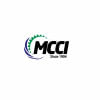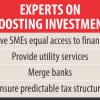Bangladesh needs to overcome barriers to private investment

Bangladesh needs to overcome barriers to increasing private investment, as year-on-year private sector credit growth fell short of the government target of 11 percent for this month, according to Bangladesh Business Climate Index 2024.
In December 2023, it experienced a slightly lower year-on-year growth of 10.2 percent, compared to its growth rate of 10.9 percent in December 2022, it said.
The index was released by the Metropolitan Chamber of Commerce and Industry (MCCI) and Policy Exchange, Bangladesh (PEB) in Dhaka recently.
The growth rate was primarily influenced by higher domestic and international commodity prices, coupled with a notable depreciation of the Bangladeshi taka against the US dollar, it said.
Despite that, Bangladesh performed fairly well compared to many other emerging and developing Asian economies, it added.
Bangladesh is acknowledged as a burgeoning investment hub, said the index.
Foreign direct investment (FDI) remains limited and predominantly focused on traditional sectors such as garments and textiles, oil and gas, energy and power, financial services and pharmaceuticals, it said.
The FDI is a powerful tool for developing the Bangladesh economy and can significantly contribute to achieving the country's socioeconomic objectives, including poverty reduction goals, it added.
The inflow of foreign capital strengthens the domestic investment base, stimulates economic activities, creates employment opportunities, and brings along technological advancements and managerial expertise, which can have a transformative effect on local industries, said the index.
The inflow of private investment and FDI is hampered by various factors, which have prevented the country from keeping pace with many of its comparator nations, it said.
The FDI flowing into various sectors of Bangladesh offers valuable perspectives on the nation's economic terrain and highlights the industries drawing notable investments, it said.
In FY2023, the manufacturing sector in Bangladesh received the highest net FDI inflows, amounting to $1208.56 million, which accounted for 37.2 percent of the total FDI, it added.
Bangladesh's business environment deteriorated slightly in 2023 compared with 2022, mainly because of sluggish regulatory reforms, weak infrastructure and difficulty in access to finance, according to the index.
Measured on a scale of 0-100, the homegrown index fell to 58.75 in 2023 from 61.95 the previous year.

 For all latest news, follow The Daily Star's Google News channel.
For all latest news, follow The Daily Star's Google News channel. 








Comments